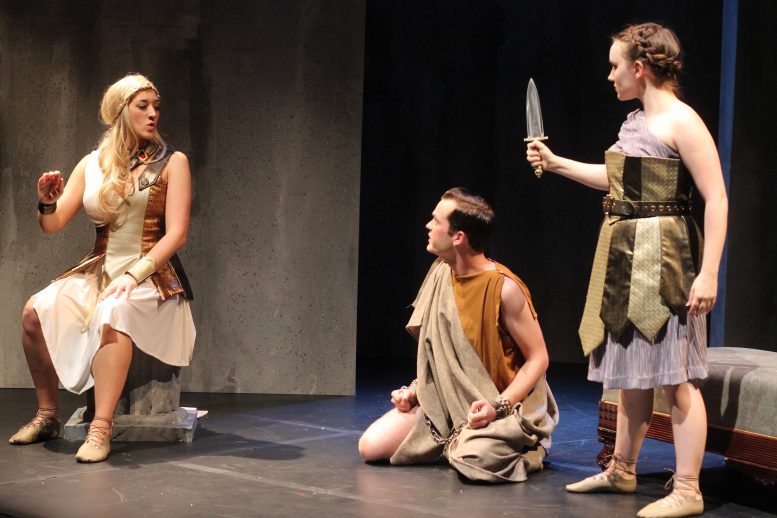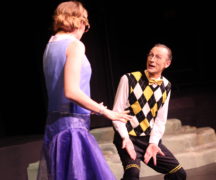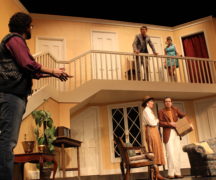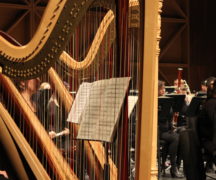By DAVID DUPONT
BG Independent News
The Frau in “Amazons and Their Men” is explicitly said not to be Leni Riefenstahl, the great German filmmaker who put her prodigious talents to the service of the Nazis.
She is Riefenstahl’s moral doppelganger who allows us to view the filmmaker’s crisis of conscience between art and reality from another angle, one that puts her in even harsher light that reveals her self-deception. Art can never isolate itself from its context; reality has a way of infecting artifice.
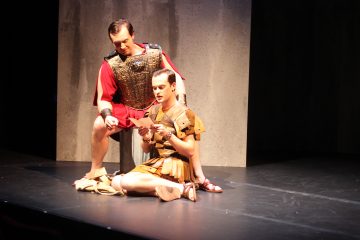
Tyler Fugitt (left) and Adam Nolan
Jordan Harrison’s “Amazons and Their Men” opens tonight (Thursday, Oct. 19) at 8 p.m. in the Eva Marie Saint Theatre at Bowling Green State University, and continues with shows Friday at 8 p.m., Saturday at 2 and 8 p.m., and Sunday at 2 p.m. Next weekend shows are Oct. 26 and 27 at 8 p.m. and Oct. 28 at 2 and 8 p.m. Advance tickets are $15 for adults and $5 for students and children; all tickets the day of the performance are $20. Tickets can be purchased at bgsu.edu/arts or the Wolfe Center box office.
As the play opens, we find The Frau (Sarah Drummer ) filming what she perceives as her masterpiece “Penthesilea” a version of Greek myth in which and the Greek hero and her enemy Achilles fall in love.
It is clear what draws her to this story, Penthesilea, queen is a strong, dominant woman, not unlike how she sees The Frau sees herself. Yet the passions within the story are at odds with her controlling nature. Passion for her is a tool to achieve her goal of a visually stunning work of art.
That work aspires with a formal, chilly beauty.
Her need for control extends to using a Jew from the ghetto, The Man (Tyler Fugitt), to play Achilles. She can use his questionable status under the Nazis to get her way. And then when she casts Patroclus, Achilles close friend, she chooses The Boy (Adam Nolan), a Roma, commonly called Gypsies, another Nazi target.
Her two leading men, these men of the Amazons, fall in love and have a passionate affair, another sure way to be condemned by the Nazis.
Then there is The Extra played by Anna Parchem. She states early on that off screen the star becomes smaller but the extra grows “huge.”
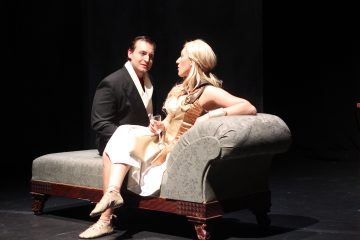
Tyler Fugitt with Sarah Drummer
The extra, who we learn is The Frau’s sister, does grow throughout the play. She is the play’s central eye and conscience. She can only do this though by suppressing her own passions.
And when confronted by her sister as being “an aberration,” The Extra does what she does best on the stage, her specialty, dying.
The Frau cannot control the passions on her set, nor can she stop them from leaching into her work, upsetting its cold aesthetic.
As the actors play out the filming on stage, stills from the film are projected above the stage. At first the cast member recite their melodramatic lines in tones distinct from how they speak off camera. But over time, the melodrama of the film and the drama of their lives come together and the distinction between Achilles and the Jewish actor, between Patroclus and the telegram delivery boy, between The Extra and the director’s sister, fades.
There seems little distance from the start between The Frau and The Amazon queen. Penthesilea embodies how The Frau envisions herself. And in the end, they lose control with brutal results.
Fugitt also portrays the minister of information, a suave manipulator, who controls funding for The Frau’s film, and thereby controls her as much as she may resist.
The cast manages this shifting sense of reality fluidly. They have fun with the outrageous film dialogue in a way that heightens the tragic undertow. The tone throughout is darkly comic with the laugh lines serving as a highlighter to mark plays emotional fault lines.
Twice the Patroclus character, played first by The Extra and then The Boy, tells Achilles: “She makes you speak in metaphors. That can’t be good.” It draws laughs because it is such a cornball expression, yet it touches on a central conflict in the play. The metaphor masks true emotion.
“Amazons and Their Men” is in the end a tragedy disguised as comedy, a reflection on the dangers of pursuing beauty as an end in itself that is itself beautifully realized.

